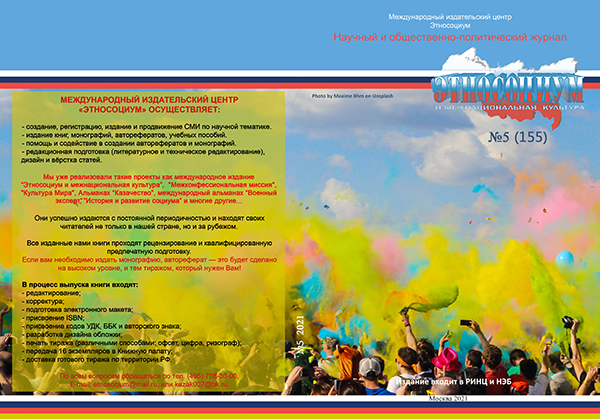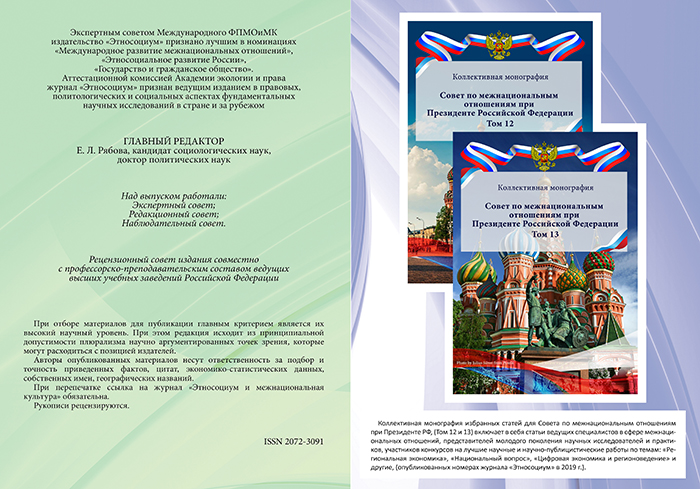

Content
|
COUNCIL OF INTERNATIONAL RELATIONSHIP
|
|
|
Mikhailov V.A., Aliev T.E. Basic tactics of information warfare
|
9
|
|
Nigmatullina T.A. Ethnopolitical codification: mythology and identity
|
14
|
|
ACTUAL PROBLEMS OF MODERN SOCIETY
|
|
|
Mikhailova A.V. Methodological toolkit for the study of relations between the State and confessions
|
46
|
|
Suzdaleva T.R. The players of the political modernization of modern Russia
|
54
|
|
Budzilevich V.V. Strategic management in the digital economy
|
62
|
|
Maksimov A.S. Specificity of using methods and technologies hybrid war in the post-Soviet space
|
69
|
|
Makhmudov A.S. "Places of memory" and the symbolic basis of parliamentarism
|
79
|
|
REGIONAL STUDY
|
|
|
Bulakh E.V., Zaychenko A.B. Methodology for the study of the territorial foundations of self-government, principles and problems in the practice of establishing the boundaries of TPSG
|
89
|
|
INTERNATIONAL RELATIONSHIPS
|
|
|
Ryabova E.I., Ternovaya L.O. Archimoldo's code: reasons for the fragmentation of the social world and assembly instructions
|
100
|
|
Komarova V.N. Language in the context of relations between the state and the regions in Italy: the case of Sicily
|
110
|
|
Abstracts
|
119
|
|
Authors
|
127
|
|
Requirements to materials submitted to the international publishing house "Etnosocium"
|
129
|
The use of information as a weapon against the enemy is a consequence of the development of technology in the modern era. The so-called information wars are waged using a number of tactics such as the use of the media and social media. It is becoming more and more difficult for international law to regulate information warfare due to the non-material nature of the damage caused by information warfare operations. The unregulated nature of information operations allows information warfare to be used to gain an advantage over its adversaries. All this creates a threat to information security, where more and more attention has to be paid to preventing or reducing the likelihood of unauthorized access to data or illegal use, disclosure, violation, deletion, damage, modification, verification, recording or devaluation of information. This also includes actions to mitigate the negative consequences of such incidents.
Keywords: information war, propaganda, disinformation, content, security, Internet.
The article is devoted to a socially significant problem in the modern world, including in Russia, - the formation of multidimensional human identities as a representative of an ethnos, region, linguistic and religious community, a bearer of distinctive traditions. In this process, the mythological and folklore heritage takes an active part, influencing the construction of modern ethnopolitical realities. Myth, folklore and history are viewed by the author in a panoramic manner, as various ways of ethnocultural communication, systematization and genesis of the people in the cultural landscape, as a tool for the formation of multiple identity.
Keywords: myth, folklore, traditions, ethnopolitical projection, codification, reconstruction, values, identities.
This article justifies the methodological toolkit for the study of relations between the State and confessions based on the principle of integration of the humanities: its key approaches consist of the methods of political science, i.e. systemic approach, political and legal analysis, method of comparative law and comparative state studies.
Keywords: method, political science, research methodology, political and legal analysis, systemic approach, relations between the State and confessions.
Political modernization of modern Russia is a complex and at the same time urgent process necessary for the development of the institutional political and economic environment. At the same time, for its successful launch, it is important to determine the actors who will be responsible for its implementation. Directly, this article will talk about the players in the political modernization of modern Russia. So, for the author it is important to understand what institutional factors of the formation of players exist, as well as what functional features they carry in themselves.
Keywords: political modernization, institution, institution, players, actors, transformation, transaction costs.
The article is devoted to the studying of issues of strategic management under the influence of the digitalization process. The analysis of approaches to the definition of the concepts of "strategic management" and "digitalization". The features of the influence of digital processes at various stages of strategic management are given. Also the author's substantiation of the importance of digitalization tools in strategic management is presented.
Keywords: strategic management, digitalization, digital technologies, digital economy.
The article is devoted to the problem of using the methods and technologies of hybrid warfare in the post-Soviet space in the framework of the hybrid confrontation between the United States and the Russian Federation. The purpose of the article is to identify the specifics of using the hybrid impact toolkit in the zone of Russia's geopolitical influence. To achieve this goal, the article solves the following tasks: description of the algorithm for implementing the scenario of "color revolutions"; characteristics of the algorithm for selecting the victim country; determination of the factors contributing to the implementation of the hybrid impact. An analysis of the experience of using the methods and technologies of hybrid warfare in the post-Soviet space allows us to consider it as a theater of military operations. The author came to the conclusion that the choice of the victim state is solely due to its geopolitical position and significance for solving the tactical tasks of the hybrid war of the United States against Russia (in the format of “color revolutions”), which pose threats to the national security of the Russian Federation. The set of measures applied in Russia against attempts to implement the scenario of a "color revolution" on its territory, being preventive, is an attempt to solve the problem at the operational level, while it requires a solution at the strategic level.
Keywords: hybrid war, post-Soviet space, Russia, USA, “color revolutions”.
Parliamentary relations have the property of an integrative perception of reality based on the multi-subject composition of the participating subjects, as well as a wide range of agenda oriented to multiple requests. By itself, the interpretation of parliament as a special institution of influencing the political system has sufficient grounds for the development of political science, as well as socio-philosophical thought.
In this article, we are faced with the task of considering parliament together with those theoretical constructions that allow us to look at the institution, traditional for all researchers, in a different way: in the mainstream of postclassical and non-classical understanding. Due to the fact that the symbolic basis of parliamentarism in our time has to be developed, we will be able to give a qualified assessment of the social environment in which the legislature functions.
Keywords: parliament, parliamentarism, “places of memory”, symbolic basis, post-classical theories, non-classical theories, neo-institutionalism, rational choice theory, value approach.
The political and legal concept of local self-government within the framework of the dualistic theory did not affect the recognition of the corresponding status for one of the forms of its implementation in Russia. A community that ensures the integrity of the state and has the right to self-organization was left without proper legal support for its activities. The article proposes a theoretical substantiation of the possible principles for establishing the boundaries of the implementation of TSG and examines the practical problems of this process.
Keywords: theories of local self-government; neighboring community, part of the territory of the municipality; territorial public self-government (TSG).
The article analyzes the work of the Italian artist of the late Renaissance Giuseppe Arcimboldo from the standpoint of searching for elements of a common social code in it, characteristic of any era of social transit, when the world is plunged into a state of uncertainty. The lack of social consensus, a holistic vision and a program for moving forward in history turned into the tragedies of wars and revolutions.
Keywords: history, art, social reality, psychology, painting, mannerism.
The article is devoted to the non-recognition in Italy of the Sicilian idiom (Sicilianu) contrary to the arguments of competent international organizations, researchers and its native speakers, and to the political background of this non-recognition.
Keywords: Sicily, idiom, Italy, non-recognition of language status.